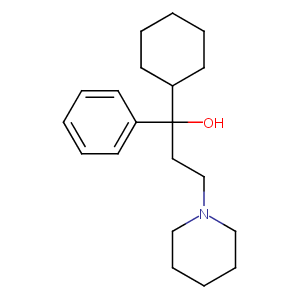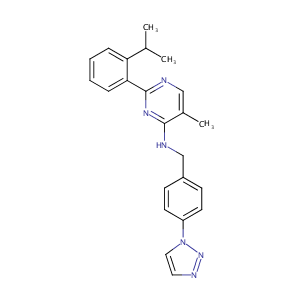| 1 |
Recurrent recessive mutation in deoxyguanosine kinase causes idiopathic noncirrhotic portal hypertension.Hepatology. 2016 Jun;63(6):1977-86. doi: 10.1002/hep.28499. Epub 2016 Mar 31.
|
| 2 |
URL: http://www.guidetopharmacology.org Nucleic Acids Res. 2015 Oct 12. pii: gkv1037. The IUPHAR/BPS Guide to PHARMACOLOGY in 2016: towards curated quantitative interactions between 1300 protein targets and 6000 ligands. (Ligand id: 7315).
|
| 3 |
Trihexyphenidyl FDA Label
|
| 4 |
Obesity: pathophysiology and clinical management. Curr Med Chem. 2009;16(4):506-21.
|
| 5 |
Deubiquitylating enzymes and drug discovery: emerging opportunities. Nat Rev Drug Discov. 2018 Jan;17(1):57-78.
|
| 6 |
The role of M1 muscarinic cholinergic receptors in the discriminative stimulus properties of N-desmethylclozapine and the atypical antipsychotic dr... Psychopharmacology (Berl). 2009 Apr;203(2):295-301.
|
| 7 |
An in vitro coculture system of human peripheral blood mononuclear cells with hepatocellular carcinoma-derived cells for predicting drug-induced liver injury. Arch Toxicol. 2021 Jan;95(1):149-168. doi: 10.1007/s00204-020-02882-4. Epub 2020 Aug 20.
|
| 8 |
Increased mental slowing associated with the APOE epsilon4 allele after trihexyphenidyl oral anticholinergic challenge in healthy elderly. Am J Geriatr Psychiatry. 2008 Feb;16(2):116-24. doi: 10.1097/JGP.0b013e31815aff75.
|
| 9 |
Synthesis and structure-activity relationship studies of N-benzyl-2-phenylpyrimidin-4-amine derivatives as potent USP1/UAF1 deubiquitinase inhibitors with anticancer activity against nonsmall cell lung cancer. J Med Chem. 2014 Oct 9;57(19):8099-110.
|
|
|
|
|
|
|


